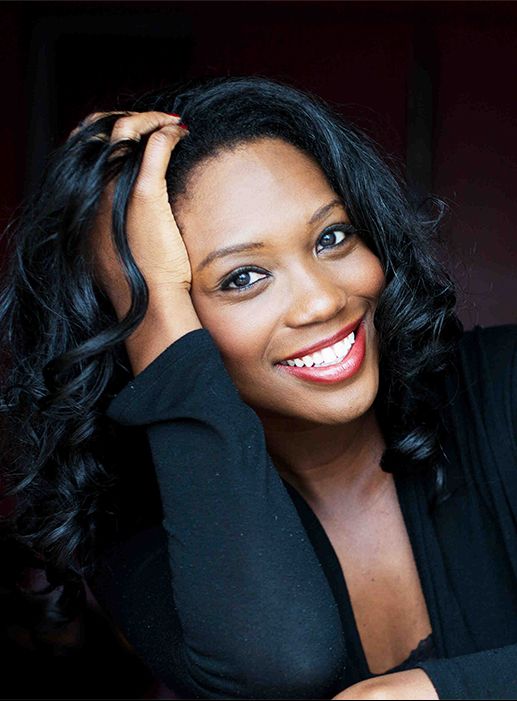Chamber Music Society returns live and al fresco with an Adolphe premiere

No trumpets blared Saturday night in Damrosch Park. Instead, a sly blues riff on a lone violin heralded the return of the Chamber Music Society of Lincoln Center to in-person performance just south of its home campus, after a 14-month absence.
Gershwin’s Three Preludes formed a prelude of sorts, with the Society musicians going on to a world premiere–Bruce Adolphe’s song cycle Water Songs, lushly shaped by soprano Angel Blue—then closing with a crackling rendition of Dvořák’s Piano Quintet in A major, Op. 81.
The masked, health-vetted, temperature-checked, and widely-spaced audience in the broad plaza mustered an enthusiastic response in spite of it all. With the CDC’s recent mask-doffing advice ringing in one’s ears, the management’s elaborate precautions may have seemed “so April,” but there was still a feeling of daring in this shell-shocked city, of dipping one’s toe into a barely-remembered, forbidden pleasure.
The stage of the Guggenheim Bandshell had been built out as part of Lincoln Center’s summer “Restore Stages” program, and the chamber musicians made discreet use of its pop accoutrements: amplification and colored lighting (green for Adolphe, orange for Dvořák).
The result was an agreeable if somewhat hybrid experience—chamber music without the chamber, its subtleties somewhat aggrandized by the outdoor pop medium. The engineering was first-rate, conveying the interplay and balance of the instruments, but it was still engineered sound. (The violins, for example, tended to sound beefier than in real life.) One couldn’t help missing the acoustics of instruments in a room, and the roar of closely packed people applauding.
But the important thing at this moment was the performance, in real time, by musicians onstage for an in-person audience. And that was an enormous advance over the past year’s diet of online streams.
The evening’s other newsmaker, Adolphe’s fine new cycle of six songs, proved as mutable as the element that inspired it, flowing, dripping and misting its way through moods from passionate to humorous. Composed in 2019 for Angel Blue and her planned, but canceled, 2020 recital tour, Water Songs finally made its bow Saturday night, with Blue sensitively partnered by pianist Bryan Wagorn.
Adolphe’s choice of open-ended, enigmatic texts, his veiled tonal harmonies and avoidance of obvious watery scene-painting all made imaginative demands on the listener. One could hardly have asked, however, for a more congenial guide though this poetic landscape than Blue, with her full, inviting tone and gorgeously sustained adagio phrases in some songs and sly humor in others.
In remarks from the stage, Adolphe placed his six songs on an arc from meditative to intense to funny and back again. “You Are Water” (text by Rumi) had the soprano intoning largely in middle range with a piano mostly playing a single melodic line. The hurricane-inspired imagery of “Song in Flood Time” (Katherine Barrett Swett) prompted more probing rhetoric for the piano and malleable lines and melisma for the singer.
Whimsy in different flavors characterized “Feste’s Song” (Shakespeare, Twelfth Night) and “Water Facts” (statistics from online sources), the one scherzando and athletic for pianist and singer, the other incongruously dramatic over such lines as “A jellyfish and a cucumber / Are each ninety-five percent water.”
“Like Rain it sounded till it curved” (Emily Dickinson) returned, more explicitly this time, to turbulent images of wind and flood, the soprano soaring high and forte. Despite the similarity of its imagery to Dickinson’s, “All day I hear the noise of waters” (James Joyce) prompted a gently melancholy setting, the singer musing darkly to a repeated question in the piano, bringing the cycle to a soft, enigmatic close.
Pianist Wagorn remained alert to every spurt and trickle of piano parts designed to do a lot with a few notes. As the sun set behind the bandshell on a near-perfect spring day, a chorus of sparrows in the trees ringing the plaza contributed some natural counterpoint of their own.
Bracketing the Adolphe work were two items with folksy appeal for a late-spring evening. Gershwin’s piano pieces, turned into chamber music by Jascha Heifetz’s cleverly contrapuntal arrangement for violin-piano duo, sounded alternately scintillating and swoony in the lively rendering by violinist Kristin Lee and pianist Wu Han. In the blues prelude, Lee played with authentic sweetness and portamento—authentic, that is, to Heifetz, in music that had already traveled some distance from its African-American origins. Wu Han asserted herself somewhat more than Heifetz’s accompanists generally used to do.
Speaking from the stage to open the concert, the Society’s always-ebullient co-director Wu Han outdid herself in praising the organization’s financial condition and online streaming during the pandemic, and in welcoming this evening’s return to live performance. And there was a kind of opening-night energy to her polished performance of Dvořák’s familiar piece with violinists Danbi Um and Kristin Lee, violist Paul Neubauer, and cellist David Finckel.
The irresistibly propulsive first movement slipped with ease from feathery leggiero to muscular forte and back. Neubauer’s viola sang the mournful dumka theme of the second movement with almost Hungarian soul, followed by a feast of subtly-characterized interludes and variations.
The furiant-scherzo flew lickety-split in a virtuoso turn for the ensemble, relieved by a dreamy trio, freer in mood but just as together. The frothy finale was as notable for its attention to instrumental dialogue as for its headlong momentum.
And as the Dvořák drew to a close, a sliver of a new moon emerged from the clouds over the bandshell in the gathering dusk, an exquisite symbol of new beginnings.
This concert can be streamed for free on the CMSLC website.
The next Summer Evenings Outdoors concert by CMS in Damrosch Park will feature music for strings by Dvořák and Mendelssohn, 7:30 p.m. Saturday. chambermusicsociety.org; 212-875-5788.